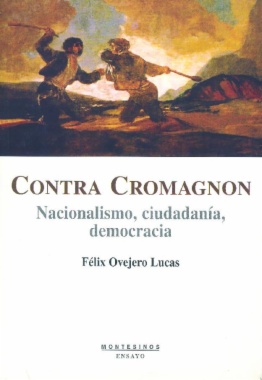The relationship of a part of the Spanish left with nationalism is enigmatic. While declaring himself non-nationalist, he defends everything that the nationalists defend. The implication is imposed: either the nationalists are not nationalists or the left is nationalist. The first possibility is unlikely. The second leaves us at the door of a question: can the left be a nationalist? The left does not seem to have understood that the obligation to defend the right of anyone to express their views does not force them to defend such points of view. Once guaranteed that everyone can tell what they want, political criticism begins. That is true with nationalism as with the Church. If the criticism does not occur, The question about whether the left can be a nationalist now leaves us on the threshold of another: Is it the left nationalist left? Born in Barcelona, Félix Ovejero has a PhD in Economic Sciences from the University of Barcelona, and a professor since 1987 As a visiting scholar he was at the University of Chicago and the University of Madison (Wisconsin). He has published, among other texts, From nature to society (Peninsula, 1987); Interests of all, actions of each (21st century, 1989); The fertile Chimera (Icaria, 1994); Market, ethics and economy (Icaria, 1994); The reasons of Socialism (with Roberto Gargarella, Paidós, 2001); Inhospitable freedom (Paidós, 2002); New republican ideas (with R. Gargarella and JL Martí, Paidós, 2004); The commitment of the method (Montesinos, 2004); and open process.
- Cover
- Title page
- Copyright page
- Índice
- Procedencia, agradecimientos y circunstancias
- Addendum, después de las elecciones catalanas
- Prólogo
- Primera parte: Naciones, ciudadanos, democracia
- Capítulo I. La frontera, la nación
- Antes de las fronteras
- El nacimiento de la nación
- El socialismo
- Capítulo II. El liberalismo: la frontera de la propiedad
- La libertad liberal
- El Estado como un club
- La democracia y la frontera
- Las fronteras de la riqueza
- Capítulo III. El comunitarismo: las fronteras de la identidad
- La propuesta multicultural
- El demos como destino: la nación
- Capítulo IV. Republicanismo: las fronteras de la justicia
- La libertad republicana
- Democracia, justicia y fronteras
- La protección de las minorías
- Segunda parte: La batalla de las palabras
- Capítulo V. La nación y el nacionalismo
- Capítulo VI. La nación: del mito a la moral
- La historia de la nación
- El relevo de la filosofía política
- Capítulo VII. Igualdad de las lenguas, igualdad de los ciudadanos
- ¿Igualdad de qué?
- Políticas lingüísticas
- La justificación de las políticas
- La perspectiva del republicanismo
- Tercera parte: Intervenciones
- Mentiras públicas, verdades privadas
- ¿Hay un nacionalismo moderado?
- La autodeterminación y la izquierda
- Preguntas para el día siguiente
- Cuestión de cercanías
- ¿Diez programas hacen un proyecto?
- Los errores de ERC y las opciones del PSOE
- ¿Razones (nacionalistas) de izquierda?
- De lenguas, sendas, mercados y derechos
- Un manifiesto de ciudadanos
- El precio de las naciones
- Encerrados con un solo juguete
- La perpetua adolescencia
- “Sóc qui sóc que no sóc jo”
- La izquierda, de la igualdad a la diferencia
- Días de agua en Dogville
- Cuarta parte: Polémica sobre izquierda y nacionalismo
- Entrevista sobre izquierda y nacionalismo
- Estado-Nación, constitucionalismo e identidad
- Algo más sobre izquierda y nacionalismo
- Conclusión
- Para terminar

